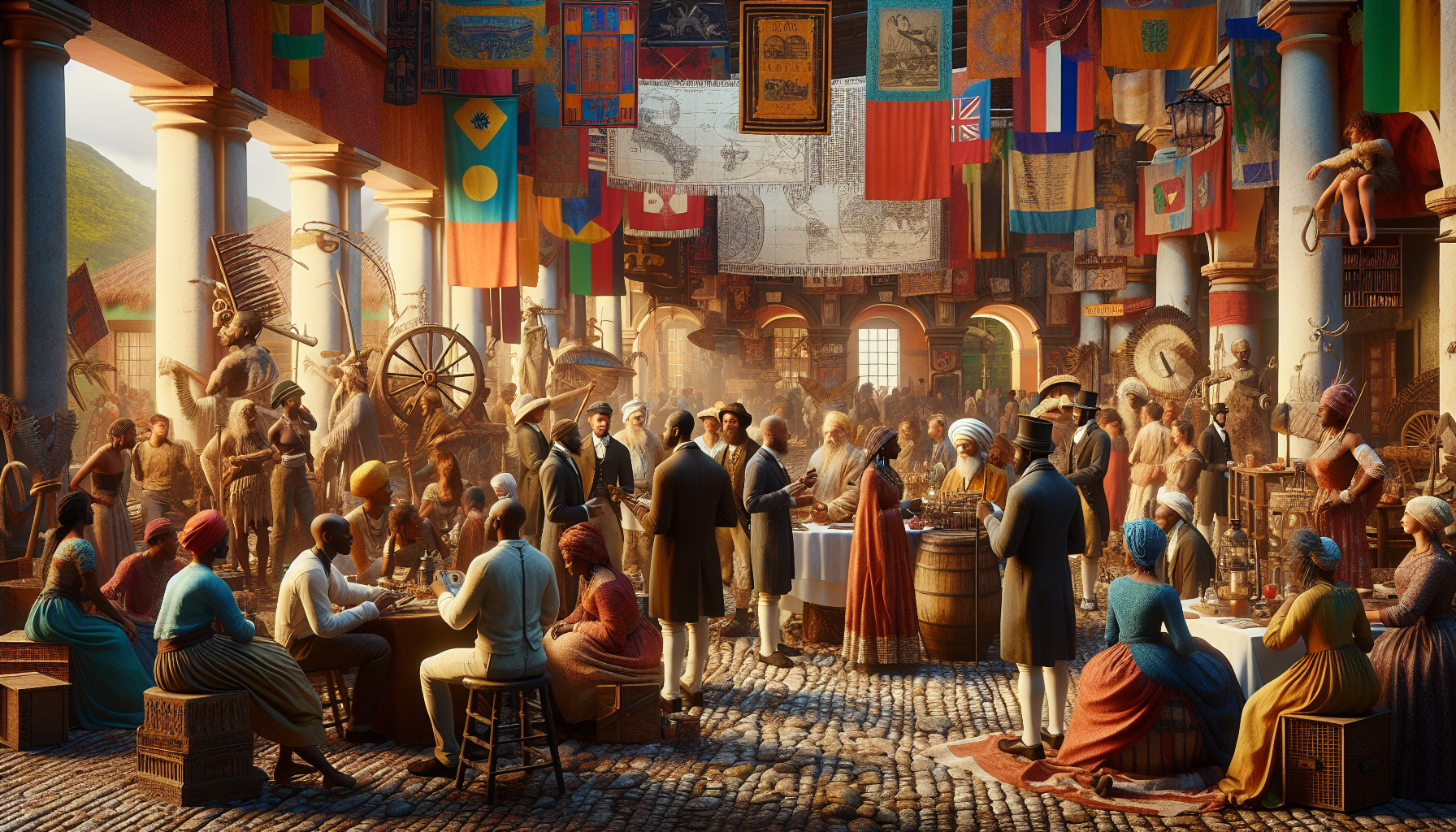In the vast tapestry of human history, languages serve as the threads that weave cultures, ideas, and stories together. Yet, as time marches forward, many of these languages fall silent, fading into the annals of history as “dead languages.” These are the tongues no longer spoken in daily life, seemingly relegated to the dusty corners of libraries and museums. However, what if we told you that these dead languages are far from obsolete? That they, in fact, hold the keys to unlocking the mysteries of literature and continue to shape narratives even today? 📚
Imagine a world without the profound epics of Homer, the philosophical inquiries of Plato, or the political treatises of Cicero. The influence of Latin, Ancient Greek, and other ancient languages is undeniable in the literary canon. These languages may no longer echo in marketplaces or homes, but they resonate in the pages of books and the minds of scholars. By delving into the study of dead languages, we gain unparalleled insights into the thoughts and cultures of bygone eras, enriching our understanding of modern literature and its roots. This journey through linguistic history reveals not only how ancient tongues shape storytelling today but also how they inspire contemporary writers to explore universal themes of human experience.
As we embark on this exploration, we will uncover the fascinating ways in which dead languages influence modern literary works. From the structural intricacies borrowed from Latin syntax to the rich tapestry of myths and legends that provide inspiration for countless stories, the remnants of these languages are everywhere. We will delve into case studies of famous authors who drew heavily from ancient sources, demonstrating how these linguistic legacies breathe life into new creations. Additionally, we’ll examine how the study of these languages fosters a deeper appreciation for literary techniques, enhancing both the writing and reading experience.
Join us as we unravel the secrets of dead languages and their profound impact on literature. This exploration is not just an academic pursuit; it is a celebration of the enduring power of words and the human spirit. Whether you’re a lover of languages, a literature enthusiast, or simply curious about the hidden influences that shape the stories we cherish, this journey promises to enlighten and inspire. So, let’s turn the page and step into a world where the past and present converge, revealing the timeless dance of language and literature. 🌍
## The Influence of Dead Languages on Modern Literature
In the vast tapestry of human civilization, language serves as both a tool and a treasure. Among the myriad languages that have existed, many have faded into the annals of history, often categorized as “dead languages.” These languages, despite no longer being spoken in daily conversations, continue to hold a profound influence over the world of literature. From ancient scripts like Latin and Ancient Greek to the mystical whispers of Old Norse and Sanskrit, these languages shape the narratives, styles, and themes of contemporary literature in ways that are both subtle and transformative.
### The Role of Latin in Shaping Literary Traditions
Latin, often dubbed the “language of the learned,” has been instrumental in shaping Western literature. Despite its classification as a dead language, Latin’s influence is omnipresent, deeply embedded in the fabric of English literature and beyond. It served as the lingua franca of educated Europeans for centuries, ensuring its survival through written works even as spoken Latin evolved into the Romance languages.
#### Latin Roots in Modern Literature
Latin has gifted the English language with a vast array of vocabulary, enriching it with words that convey complexity and nuance. Many literary terms and rhetorical devices in English are derived from Latin, giving writers a powerful toolkit to express intricate ideas. The works of Shakespeare, for instance, are replete with Latin influences, both in language and in structure. His plays often allude to Roman history and mythology, drawing on Latin texts and traditions.
#### Preservation of Classical Texts
The preservation of classical Latin texts has been pivotal in keeping the language alive in the literary world. Monastic scribes meticulously copied works by authors like Virgil, Ovid, and Cicero, ensuring their transmission through the ages. These texts not only served as a foundation for the Renaissance’s rediscovery of classical knowledge but also inspired countless authors, from Dante to Milton, who found in them a wellspring of inspiration and wisdom.
#### Latin as a Literary Device
In contemporary literature, Latin often appears as a literary device, lending an air of authenticity, antiquity, or mystery. Authors might include Latin phrases or quotations to evoke a sense of timelessness or to connect modern narratives with the grandeur of ancient Rome. This usage underscores Latin’s enduring role as a symbol of intellectual authority and cultural depth.
### Ancient Greek: The Bedrock of Western Literary Canon
Ancient Greek, with its rich tradition of epic poetry, drama, and philosophy, has left an indelible mark on literature. While it may not be spoken conversationally today, its legacy permeates modern storytelling, offering archetypal themes and narrative structures that continue to resonate with readers and writers alike.
#### Greek Mythology in Literature
Greek mythology, a cornerstone of Ancient Greek culture, has provided a vast repository of stories that have been retold and reimagined across generations. These myths explore universal themes of heroism, fate, and the human condition, making them timelessly relevant. Authors like Homer and Hesiod, through their epic poems, crafted narratives that have influenced countless literary works, from James Joyce’s “Ulysses” to Rick Riordan’s “Percy Jackson” series.
#### The Philosophical Underpinnings
The philosophical inquiries of Ancient Greek thinkers such as Plato and Aristotle continue to inspire modern literature. Their exploration of themes like justice, beauty, and the nature of reality provides a rich intellectual backdrop for contemporary narratives. Many authors weave philosophical dialogues into their works, echoing the dialectical method popularized by Greek philosophers, to challenge readers and provoke introspection.
#### Tragedy and Drama
The structure of Greek tragedies and dramas has profoundly influenced Western theatrical traditions. The works of playwrights like Sophocles and Euripides introduced dramatic elements such as the tragic hero and catharsis, which remain staples in modern storytelling. The exploration of complex emotions and moral dilemmas in Greek drama offers a template for writers to explore similar themes in their own works.
### The Mystical Allure of Sanskrit in Literature
Sanskrit, often referred to as the “language of the gods,” holds a revered place in the literary traditions of South Asia. Its extensive body of literature, encompassing poetry, epics, and philosophical treatises, offers a window into the spiritual and cultural ethos of ancient India.
#### The Epic Tradition
The Sanskrit epics, the Mahabharata and the Ramayana, are monumental works that continue to inspire writers globally. These texts delve into themes of duty, love, and righteousness, providing rich narrative tapestries that are reinterpreted in various cultural contexts. Their influence extends beyond literature, shaping storytelling traditions in film, theatre, and oral narratives.
#### Spiritual and Philosophical Depth
Sanskrit literature is deeply intertwined with the spiritual and philosophical teachings of Hinduism, Buddhism, and Jainism. Texts like the Upanishads and the Bhagavad Gita explore profound philosophical concepts that resonate with seekers of truth and wisdom. Authors who engage with these texts often infuse their narratives with spiritual depth, exploring themes of enlightenment and transcendence.
#### Poetry and Aesthetics
The aesthetic principles of Sanskrit poetry, particularly the concept of “rasa” or emotional flavor, have influenced literary traditions worldwide. Sanskrit poets like Kalidasa have crafted works that celebrate beauty, nature, and human emotions, inspiring poets across cultures to explore the nuances of aesthetic experience in their own writing.
### The Resurgence of Old Norse in Modern Fantasy
Old Norse, the language of the Vikings, has experienced a revival in modern literature, particularly within the fantasy genre. Its rich mythology and sagas provide fertile ground for writers seeking to craft epic narratives that explore themes of heroism, adventure, and the supernatural.
#### Norse Mythology in Popular Culture
Norse mythology, with its pantheon of gods and mythical creatures, has captured the imagination of contemporary audiences. Authors like J.R.R. Tolkien and Neil Gaiman have drawn heavily from Norse myths, creating worlds where the lines between reality and fantasy blur. The enduring popularity of these myths underscores their universal appeal and their capacity to inspire new stories.
#### The Sagas: Stories of Heroism
The Icelandic sagas, with their tales of exploration, conflict, and survival, offer a unique narrative style characterized by stark realism and moral complexity. These stories provide a template for authors crafting narratives that explore the human condition against the backdrop of a harsh and unforgiving world. Their influence is evident in modern fantasy literature, where the heroic journey and the struggle against fate remain central themes.
#### Linguistic Legacy
Old Norse has also left a linguistic legacy that enriches modern English. Words and phrases from Old Norse permeate the English language, offering writers a unique vocabulary to evoke the ethos of Norse culture. This linguistic heritage adds authenticity and depth to narratives set in or inspired by the Viking Age.
### Comparative Analysis of Dead Languages in Literature
The influence of dead languages on modern literature is vast and multifaceted. Each language offers unique contributions, shaping literary traditions in distinctive ways. The table below provides a comparative analysis of the impact of Latin, Ancient Greek, Sanskrit, and Old Norse on literature:
| Language | Key Contributions | Influence in Modern Literature |
|---|---|---|
| Latin |
|
Intellectual depth, classical allusions, narrative structure |
| Ancient Greek |
|
Thematic exploration, philosophical dialogue, dramatic elements |
| Sanskrit |
|
Spiritual depth, narrative richness, aesthetic beauty |
| Old Norse |
|
Fantasy narratives, heroic themes, cultural authenticity |
Each language’s enduring legacy is a testament to the power of the written word to transcend time and space, influencing new generations of writers and readers. As you explore the depths of these ancient languages and their impact on literature, consider the ways in which they continue to shape our understanding of storytelling and the human experience.
For a deeper exploration of how these languages continue to influence literature, check out this engaging video: Unlocking the Secrets of Dead Languages. 📺
In conclusion, the secrets of dead languages unlock the door to a richer understanding of literature, connecting us with the timeless stories and wisdom of the past. As we continue to study and celebrate these languages, we ensure that their voices remain vibrant and vital in the ever-evolving narrative of human creativity.

Conclusion
Unlocking the secrets of dead languages offers a fascinating lens through which we can better understand the rich tapestry of literature and its profound influence on human culture. Throughout this exploration, we have delved into how ancient languages like Latin, Ancient Greek, Sanskrit, and others have left an indelible mark on literary traditions across the globe. These languages, although no longer spoken, continue to resonate through the ages, influencing modern literature in myriad ways.
Firstly, we discussed the foundational role that dead languages have played in shaping Western literature. Latin and Ancient Greek, for example, have been instrumental in the development of genres, storytelling techniques, and literary devices that are still prevalent today. Works such as Homer’s epics and Virgil’s “Aeneid” have set the stage for storytelling traditions that echo through contemporary works. These ancient texts offer a timeless reflection of human experiences and emotions, providing a template for narrative structures that writers have emulated and adapted over centuries.
Additionally, we examined how dead languages contribute to the depth and richness of modern literary works. Many authors have drawn inspiration from ancient texts, reimagining stories, and characters to fit contemporary contexts while maintaining the essence of their classical roots. This dialogue between past and present not only enriches the literary landscape but also invites readers to engage with timeless themes of love, honor, betrayal, and heroism in new and insightful ways.
Moreover, the influence of dead languages extends beyond the realm of Western literature. In regions like South Asia and the Middle East, languages such as Sanskrit and Classical Arabic have shaped literary traditions that are both unique and deeply interconnected with global narratives. The poetic traditions in these languages have inspired countless writers, offering a diverse array of styles and themes that continue to captivate readers worldwide.
Importantly, we also highlighted the role of dead languages in preserving cultural heritage and identity. As these languages are studied and analyzed, they offer insights into the societies that spoke them, shedding light on historical contexts, philosophical thought, and artistic expression. This preservation is crucial not only for academic purposes but also for fostering a deeper appreciation of our shared human history.
To underscore the importance of this topic, it’s essential to recognize that the study of dead languages opens doors to understanding the complexities and nuances of human thought across different eras and cultures. By engaging with these languages, scholars and readers alike can uncover layers of meaning that transcend time, offering fresh perspectives on contemporary issues.
We encourage you, dear reader, to consider the profound impact that dead languages have on literature and culture. Whether by exploring ancient texts, supporting language preservation efforts, or simply appreciating the echoes of these languages in modern works, there is much to gain from this journey through linguistic history. Your engagement with this topic not only enriches your own understanding but also helps keep the legacy of these languages alive for future generations.
In conclusion, the secrets unlocked by dead languages reveal a world of literary treasures waiting to be discovered. As you reflect on the insights shared in this article, we hope you feel inspired to delve deeper into the fascinating interplay between language and literature. Share your thoughts, engage in discussions, and spread the word about the enduring legacy of dead languages. Together, we can ensure that the echoes of these ancient voices continue to inspire and illuminate our world.
For further exploration, consider visiting reliable sources such as the Perseus Digital Library for access to classical texts, or the Sanskrit Documents Collection to explore ancient Indian literature. These resources offer a wealth of information for anyone interested in the profound connections between dead languages and the world of literature.
Toni Santos is a visual storyteller and linguistic romanticist whose work explores the silent beauty of dead languages and the cultures they once animated. Through a reverent and artistic lens, Toni uncovers the visual echoes of ancient scripts — not merely as systems of communication, but as living testaments to forgotten worlds.
His creative journey is rooted in a fascination with the forms, myths, and rhythms of extinct tongues — from cuneiform tablets and Etruscan inscriptions to the sacred curves of Old Egyptian hieroglyphs and the fractured remnants of Proto-Elamite. Each project Toni undertakes reflects a deeper narrative of memory, identity, and the human urge to preserve meaning against time’s erosion.
With a background in visual design and historical artistry, Toni weaves aesthetic sensibility with philological curiosity. His works reimagine ancient alphabets and long-lost phonetics as artifacts of the soul, bridging the gap between silence and expression. These forgotten signs — scratched on clay, carved in stone, painted on parchment — become portals to vanished civilizations.
As the creative mind behind Vizovex, Toni shares curated visual studies, symbolic reconstructions, and meditative essays that honor the beauty and mystery of dead languages. Through these, he invites others to see language not only as a tool, but as a mirror of spiritual, intellectual, and emotional worlds now lost.
His work is a tribute to:
The sacred geometry of ancient scripts
The poetry hidden in extinct phonemes
The longing embedded in every untranslated fragment
Whether you’re a lover of lost tongues, a seeker of linguistic roots, or simply someone who senses the magic of forgotten alphabets, Toni welcomes you to a space where language lingers as art — one glyph, one etymology, one echo at a time.




